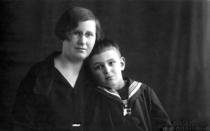Solomon Manevich with his friend Mikhail Polesov and cadet Bova
This is me, Solomon Manevich, first on the left, my friend Mikhail Polesov is beside me, and the third one is cadet Bova. The photo was taken in Kuibyshev on 4th of March 1941. Mikhail was at the front during the war. By the end of the war he had the rank of lieutenant colonel. I happened to meet him once in Moscow after the war. Since then I never heard from him.
I entered the Faculty of Chemistry at the Industrial College in 1935. After I finished the first year of studies of our military classes in the summer of 1940, which were mandatory in all technical higher educational institutions of the USSR, the training was cancelled. This military training allowed graduates to receive a military rank. I finished College with honors in November 1940. Before graduation I was called to the military registry office where I got an assignment to serve in the army in Saratov, a big Russian town near the Volga after I defended my diploma thesis. In December 1940 I arrived to Saratov. The headquarters assigned me as a machine gunner to the rifle regiment no. 110. I suffered all intimidation of a private of the army there. Any commanding officer could abuse or hurt us especially the first sergeant.
In February 1941 I was sent to Kuibyshev, a big town in Russia. As one with higher education I became cadet of the Regional school of the reserve political officers. The war was in the air. There were no discussions about the war or any preparations to the war, but we knew about the war in Europe and realized that Hitler could attack our country at any moment. In April-May many military schools in Kuibyshev accelerated graduation terms. Military units were relocating to the West. Many members or candidates of the Party graduated in the rank of junior political officers. Komsomol members were in uncertain situation. Junior political officers were required to be members or candidates of the Communist Party. Recommendations to the Party could be issued only by members of the Party, who had known us at least for a year, but we studied in school for few months.
On 22 June 1941 my friend Misha Polesov from Zaporozhiye and I watched First Lieutenant Lermontov at the Drama Theater in Kuibyshev. During an interval someone said to us 'Guys, the war began'. We left the theater.
We were on the waiting list to go to the front. Meanwhile we listened to news and couldn't understand why our victorious army was retreating with enormous casualties. In July 1941 we received an assignment to military schools in Kuibyshev for positions of Komsomol leaders at battalions. Since I was a chemical engineer I was sent to the Volsk school of chemical defense in the town of Sheihana Saratov region. At this school I was insistently advised to join the party since only a member of the Party could hold my position. After I worked at school for a year I was given a recommendation and became a candidate and then - member of the Party. I had no choice and had to join the Party. It was my duty as a military. I lived in a separate room at a barrack. I lectured to cadets. The training lasted three months before they were sent to the front.
In 1944 I was transferred to reserve regiment of chemical defense #24 in the vicinity of Sheihana. I never faced any anti-Semitism. After the war ended in 1945 I submitted my request for demobilization. It was not approved and I requested to leave. I went to Kiev to help my mother get back our apartment where other tenants settled down during the war. According to the law militaries had the priority right for having their apartments returned to them. It took me several weeks to work on it. I also had to apply some violence: my friends and I simply threw belongings of those tenants out of our apartment. The court made a verdict in our favor. After a month's vacation I returned to my military unit.
In 1946 my acquaintances wrote a request to release me from the army. This request was approved by a military plant in Kiev. I demobilized and returned to Kiev, only I was not going to work at the plant, but wanted to be involved in science. I looked for a job at educational institutions and scientific research institutes. After the potential employers saw my nationality in application form they always gave me a polite refusal. This was the first time in my life when I faced stable anti-Semitism on a state level.










